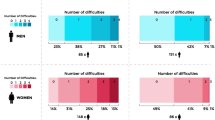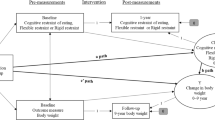Abstract
OBJECTIVE: To identify three groups of obese people entering weight loss treatment, who have distinctly different cognitive appraisals of dietary transgressions and to compare these groups on self-report inventories of eating patterns, dieting, and depression, as well as on treatment completion rates and weight loss.
DESIGN: Retrospective review of clinical records. Using a measure which evaluates eating-related cognitive appraisals, participants were categorized into one of three cognitive groups (All-or-None, Rationalization, Matter-of-Degree).
SUBJECTS: 289 treatment-seeking obese women (age: 40.9 y, body mass index (BMI): 34.7 kg/m2).
MEASUREMENTS: Self-reported eating and dieting behavior (Three-Factor Eating Questionnaire and Eating Behavior Inventory); depression (Beck Depression Inventory); attendance information and body weight obtained during treatment.
RESULTS: The cognitive group representing objective thinkers (Matter-of-Degree) reported significantly fewer problems with overeating and more personal control over eating than did the rigid, dichotomous thinkers (All-or-None). In addition, the Matter-of-Degree (MAT) group endorsed significantly less subjective hunger and fewer depressive symptoms than the other two cognitive groups. The Rationalization group was more likely to complete a treatment program than was the All-or-None group, with the MAT group not differing from either. Despite these findings, there were no significant differences among cognitive groups on total weight loss.
CONCLUSIONS: Cognitive appraisals of weight-control lapses appear to be associated with self-reported eating behavior, depressive symptoms and treatment completion rates, but not with treatment-induced weight loss. The relationship between long-term weight loss and cognitive appraisals of dieting lapses is yet to be determined. It appears necessary to assess empirically the validity of assumptions regarding factors associated with treatment outcome.
This is a preview of subscription content, access via your institution
Access options
Subscribe to this journal
Receive 12 print issues and online access
$259.00 per year
only $21.58 per issue
Buy this article
- Purchase on Springer Link
- Instant access to full article PDF
Prices may be subject to local taxes which are calculated during checkout
Similar content being viewed by others
Author information
Authors and Affiliations
Rights and permissions
About this article
Cite this article
Smith, C., O’Neil, P. & Rhodes, S. Cognitive appraisals of dietary transgressions by obese women: Associations with self-reported eating behavior, depression, and actual weight loss. Int J Obes 23, 231–237 (1999). https://doi.org/10.1038/sj.ijo.0800778
Received:
Revised:
Accepted:
Published:
Issue Date:
DOI: https://doi.org/10.1038/sj.ijo.0800778



